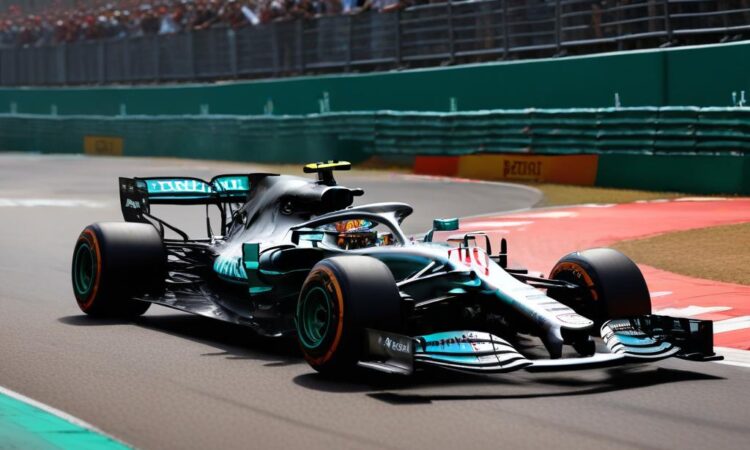Is Hamilton’s form a concern for Ferrari? And does Russell deserve more credit?: BBC F1 correspondent Andrew Benson answers your questions before the season-ending Abu Dhabi Grand Prix
The Formula 1 season is hurtling towards its dramatic conclusion in Abu Dhabi, and with it comes a flurry of questions, speculation, and analysis. BBC F1 correspondent Andrew Benson has taken the time to address some of the burning issues facing the sport before the final race.
Question 1: Lewis Hamilton’s recent performance – is it a genuine cause for concern for Ferrari heading into Abu Dhabi?
While Ferrari secured the constructors’ championship, their season hasn’t been without its struggles. Lewis Hamilton’s resurgence in recent races, albeit with a significantly upgraded car, presents a new dynamic. His improved pace and consistency, previously absent for much of the season, could be seen as a worrying sign for Ferrari. The inherent unpredictability of the Abu Dhabi track adds another layer of complexity. Hamilton, even in a car slightly inferior to the leading contenders, possesses the skill and experience to upset the apple cart. His aggressive driving style and ability to capitalise on any strategic mistakes make him a threat. While Ferrari might be favoured on paper, dismissing Hamilton’s potential impact would be a grave error. The pressure is on them to maintain their edge and ensure a smooth, error-free race to secure the remaining points battles.
Question 2: George Russell’s consistent performance – is he getting enough credit?
George Russell’s consistent podium finishes and his relentless pursuit of perfection have been a defining characteristic of his season. His performance, particularly considering the relative inconsistency of his teammate and the car’s performance fluctuations, demands recognition beyond the mere statistics. Often overshadowed by the drama at the front of the grid, Russell’s reliability and tactical prowess represent a significant asset to Mercedes. He consistently extracts maximum performance from the car, regardless of the circumstances. While individual race wins might be lacking, his contribution to the team’s overall performance is undeniably substantial, and his consistent points scoring should not be underestimated in the context of the overall championship standings. He’s showcased remarkable maturity and race craft, making him a force to be reckoned with in the coming seasons. The lack of headline-grabbing moments shouldn’t diminish the value of his consistent excellence.
Question 3: The impact of the new regulations – how have they reshaped the competitive landscape?
The introduction of the new regulations has undoubtedly shaken up the Formula 1 landscape. While some teams adapted more successfully than others, the overall effect has been a closer and more unpredictable racing season. The closer competition has elevated the importance of strategic decision-making and driver skill. We’ve seen unexpected results, with teams performing above or below expectations based on pre-season predictions. This shows the effectiveness of the regulations in improving the on-track action. The changes have provided a platform for emerging talents to flourish and have also challenged established teams to innovate and adapt quickly. This level of uncertainty going into Abu Dhabi only adds to the anticipation of the season finale.
Question 4: Abu Dhabi – what makes it such a unique and pivotal race?
The Yas Marina Circuit in Abu Dhabi presents a unique blend of high-speed sections and technical corners, making it a challenging track for drivers and teams alike. The strategic choices in tire selection and race management can drastically impact the outcome. The final race of the season also carries a significance beyond the points themselves. It’s a stage for drivers to cement their reputations and for teams to showcase their strengths and resolve. The psychological pressure on drivers, teams, and championship contenders significantly impacts performance. The atmosphere is electric, adding an extra dimension to the already intense competition. It provides a fitting climax to a season full of twists, turns, and unexpected outcomes. The fact that the championship is already decided doesn’t diminish the excitement surrounding the event; rather, it allows for more focused battles for individual glory and team positioning.
Question 5: Beyond the championship – what storylines will dominate the off-season discussions?
The off-season will undoubtedly focus on the driver market, with several high-profile contracts yet to be renewed and potential seat changes in the offing. The technological advancements made this season will also be dissected and analyzed, with teams already looking ahead to next year’s upgrades. Furthermore, discussions surrounding the regulatory changes and their long-term effects will continue to shape the future direction of the sport. The lessons learned from this season, both on and off the track, will significantly influence the strategies and approaches of teams and drivers alike. The off-season period provides the time for reflection, planning, and innovation – setting the stage for another thrilling season to come. It’s a time for strategists to review what worked and what didn’t, a chance to meticulously assess all the data and plan for the upcoming battles.
Andrew Benson’s insights provide a fascinating perspective on the upcoming Abu Dhabi Grand Prix and the wider implications for the future of Formula 1. The season’s conclusion promises high-stakes drama and could reshape the competitive dynamics of the sport in the years to come.
This concludes our Q&A session with Andrew Benson. We look forward to an exciting and unpredictable final race in Abu Dhabi!

